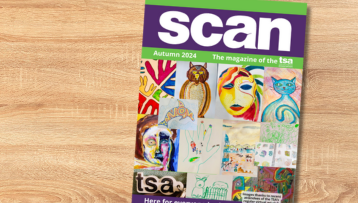First UK clinical guidelines for Tuberous Sclerosis Complex will drive higher quality and more consistent care from the NHS
The Tuberous Sclerosis Association (TSA) is delighted to announce the publication of the first UK clinical guidelines for the management and surveillance of Tuberous Sclerosis Complex (TSC).
The guidelines, which have been published by Oxford University Press in QJM: An International Journal of Medicine, provide evidence-based recommendations for delivering the best clinical care for people living with TSC in the UK.
TSC is a rare genetic disease that causes non-cancerous tumours to grow in the brain and in other vital organs, such as the heart, kidneys and lungs. Between 3,700 and 11,000 people across the UK live with TSC. The tumours caused by TSC can result in a range of health problems that present at different stages of life. These problems include heart tumours detected through prenatal screening and in newborn babies, epileptic seizures in infants, autism in children, skin problems in adolescents, and kidney or lung problems in adults.
One in every two people living with TSC have learning disabilities such as intellectual impairment and problems with attention and memory, and around 30 per cent of these individuals have profound learning disabilities. Many individuals living with TSC also have behavioural problems which have a serious impact on family life, such as autism, attention deficit hyperactivity disorder, aggression, depression, anxiety and sleep disorders.
Lead-author of the guidelines Dr Sam Amin, of the TSC Supra Regional Clinic in Bath said: “All clinicians are driven by the desire to provide the best possible care to their patients and reaching clinical consensus on disease management is a powerful way of sharing best practice. There are a wide range of symptoms and severity in TSC and it isn’t always an easy disease to treat, requiring input from a range of specialty areas. Some people are only mildly affected and experience few problems. Other people have severe problems requiring lifelong support from their families or in residential care.”
Co-author of the guidelines and TSA Trustee Dr Chris Kingswood, of the St Georges TSC Clinic in South London – which celebrated its 25th birthday last month – added: “In developing these guidelines, we have been able to call upon and harness the experience and expertise of colleagues working in a variety of fields related to TSC including genetics, neurology, paediatrics and psychology. Their input and endorsement has shaped a set of guidelines that takes specific account of local arrangements and that we hope will be adopted across the health care system across the UK.”
Only subscribers to this journal will be able to see the full article, however the TSA is hoping to publish a patient-friendly summary of the guideline here on this website and in the Spring 2019 edition of SCAN.
Ends
For further information, please contact:
Sarah Roberts, Tuberous Sclerosis Association
Email: sarah.roberts@tuberous-sclerosis.org
Tel: 07870 210308
Notes to Editors:
• Tuberous Sclerosis Complex (TSC) is a genetic disorder that causes growths to form in many different organs, primarily in the brain, eyes, heart, kidney, skin and lungs. Some people with TSC experience epilepsy, developmental delay, learning and other disabilities, autism and challenging behaviour.
• The Tuberous Sclerosis Association (www.tuberous-sclerosis.org) is the only UK charity dedicated to supporting people affected by TSC. The charity has invested over £10 million in support services and medical research.
• The UK clinical guidelines on TSC were developed through a Delphi consensus process to reach agreed guidance for the management of patients with TSC in the UK. Following a literature search and review of international guidance, 51 experts in TSC took part in research to define the guidelines arriving at clinical consensus via responses to a detailed survey. The responders were neurologists, nephrologists, psychiatrist, psychologists, oncologists, general paediatricians, dermatologist, urologists, radiologists, clinical geneticists, neurosurgeons, respiratory and neurodisability clinicians.









































































































































